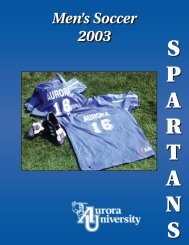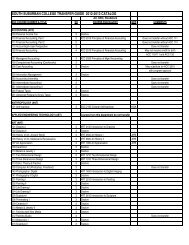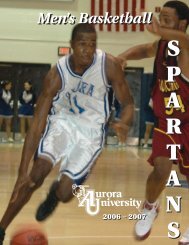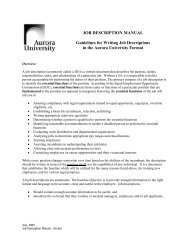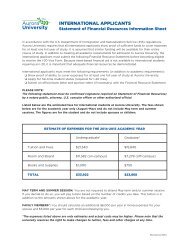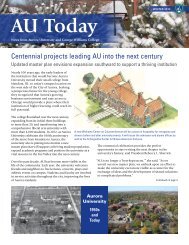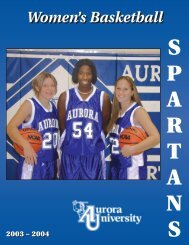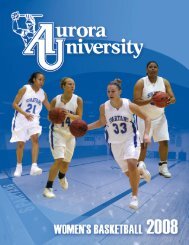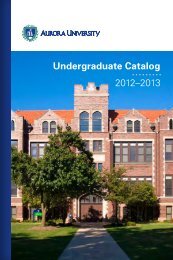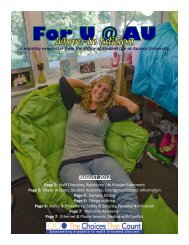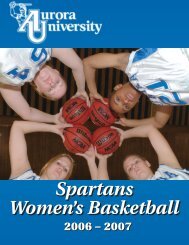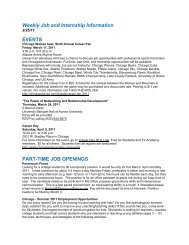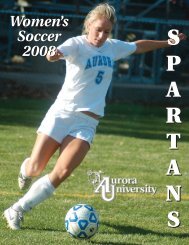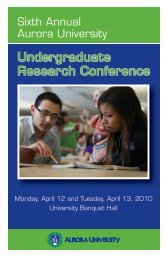Aurora University is May Term
Aurora University is May Term
Aurora University is May Term
Create successful ePaper yourself
Turn your PDF publications into a flip-book with our unique Google optimized e-Paper software.
AURORA UNIVERSITYMAY TERMCOURSE OFFERINGS • MAY 2010Contents1 Introduction2 Adm<strong>is</strong>sion and Reg<strong>is</strong>tration2 Undergraduate Tuition and Fees3 Graduate Tuition and Fees3 Course Refund and Withdrawal Policies3 Course Fees, Trip Deposits and Balancesand Course Cancellations4 Housing4 <strong>University</strong> Bookstore4 Course Numbering System and Levels5 Travel Course Offerings5 Undergraduate17 Graduate19 Special 2010 Summer Travel-Study Abroad Program22 Campus-Based Course Offerings at the <strong>Aurora</strong> Campus22 Undergraduate29 Graduate28 Campus-Based Course Offerings at theGeorge Williams College Campus28 Undergraduate30 Graduate<strong>May</strong> <strong>Term</strong> offers exciting learning opportunities that lead toacademic credit. Scheduled to meet for three weeks immediatelyfollowing the spring semester, <strong>May</strong> <strong>Term</strong> makesit possible to take one additional course and still have timefor that all-important summer job or traditional summerschool classes.Unique courses developed by faculty especially for <strong>May</strong><strong>Term</strong> make possible an intensive, in-depth study of stimulatingtopics. Some involve travel, while others focus ona science topic or culture. In addition, <strong>May</strong> <strong>Term</strong> allowsundergraduate students to catch up on general educationrequirements or get a jump-start on the upcoming academicyear. Graduate students can complete an elective orrequired course in their graduate program.1
Other benefits of <strong>May</strong> <strong>Term</strong> include:• Being immersed in a particular culture or tradition• Concentrating on just one class• Easing your course load during the fall or spring semester• Staying on track for graduation• Fulfilling a prerequ<strong>is</strong>iteA course taken during <strong>May</strong> <strong>Term</strong> typically earns three (3) orfour (4) semester hours. Due to the intensive format, there <strong>is</strong>a limit of one class during the <strong>May</strong> <strong>Term</strong> session. While <strong>May</strong><strong>Term</strong> <strong>is</strong> not required for graduation, courses count towardmeeting graduation requirements.Adm<strong>is</strong>sion and Reg<strong>is</strong>trationWhen choosing a <strong>May</strong> <strong>Term</strong> class, make sure that you havecompleted any required prerequ<strong>is</strong>ites. Reg<strong>is</strong>tration for <strong>May</strong><strong>Term</strong> begins November 1, 2009. We encourage early reg<strong>is</strong>trationfor both travel- and campus-based courses.AU Degree-Seeking Students:Currently enrolled <strong>Aurora</strong> <strong>University</strong> students in goodstanding should call to make an appointment with theiracademic adv<strong>is</strong>or in the Crouse Center for Student Successat 630-844-6870. It <strong>is</strong> important to note that all travel-basedcourses require the written consent of the instructor priorto reg<strong>is</strong>tration. You may then reg<strong>is</strong>ter for <strong>May</strong> <strong>Term</strong> classesand submit payment of your deposit to the Office of StudentAccounts. Sign up early to be sure that the class you want<strong>is</strong> not closed.V<strong>is</strong>iting Students:If you are currently attending college elsewhere, consultyour own adv<strong>is</strong>or or the reg<strong>is</strong>trar to ensure that your courseselection will meet your educational objectives at yourhome institution. You can then reg<strong>is</strong>ter for <strong>May</strong> <strong>Term</strong> as astudent-at-large. A $100 nonrefundable deposit, applicableto your tuition, <strong>is</strong> required at reg<strong>is</strong>tration if you are a v<strong>is</strong>itingstudent. For further information, call Terri Schmutz, Directorof Summer Session, at 630-844-4228, or v<strong>is</strong>it the Office of theReg<strong>is</strong>trar in Eckhart Hall.Undergraduate Tuition and FeesThe reduced tuition rate of $450 per semester hour <strong>is</strong> thelowest rate of the year. If the course involves travel, thecosts of the trip are l<strong>is</strong>ted with the course descriptions; aspecific trip deposit <strong>is</strong> required at the time of reg<strong>is</strong>tration.NOTE: Tuition charges are in addition to trip costs. Tuitioncharges for <strong>May</strong> <strong>Term</strong> 2010 are due April 30, 2010. Althoughfinancial aid <strong>is</strong> not available during <strong>May</strong> <strong>Term</strong>, any remain-2
ing loan monies from spring semester may be applied.Questions may be directed to the Office of Financial Aid at630-844-6190.Graduate Tuition and FeesA degree-seeking student whose first enrollment in graduatestudies at <strong>Aurora</strong> <strong>University</strong> <strong>is</strong> <strong>May</strong> <strong>Term</strong> will be considereda summer-semester applicant. The M.B.A. tuitionrate <strong>is</strong> $595 per semester hour; the M.S.W. tuition rate <strong>is</strong>$540 per semester hour; and the Education tuition rate <strong>is</strong>$540 per semester hour. Tuition charges for <strong>May</strong> <strong>Term</strong> 2010are due April 30, 2010. <strong>May</strong> <strong>Term</strong> <strong>is</strong> the last opportunity topay 2009–2010 tuition rates. Th<strong>is</strong> <strong>is</strong> an excellent opportunityto earn graduate course credit in only three weeks.Although financial aid <strong>is</strong> not available during <strong>May</strong> <strong>Term</strong>,any remaining loan monies from spring semester may beapplied. Questions may be directed to the Office of FinancialAid at 630-844-6190.Course Refund and Withdrawal PoliciesOnce you are reg<strong>is</strong>tered for a <strong>May</strong> <strong>Term</strong> course, you areresponsible for all charges until and unless you give writtennotice to the Office of the Reg<strong>is</strong>trar that you w<strong>is</strong>h towithdraw. A Change of Course Petition (add/drop form) canbe filed in person, by mail or via fax with the fax or postmarkdate as the effective date of withdrawal. Tuition fora <strong>May</strong> <strong>Term</strong> course that <strong>is</strong> dropped <strong>is</strong> refunded accordingto the date the course <strong>is</strong> dropped. A 100% refund of tuition(less the $100 nonrefundable tuition deposit for v<strong>is</strong>iting students)<strong>is</strong> provided through 20% of any scheduled course,no refund thereafter. Specific dates may be obtained fromthe Office of Student Accounts at 630-844-5470. NOTE: Tripdeposits and balances are not refundable.Course Fees, Trip Deposits andBalances and Course CancellationsTravel and field trip deposits are due at the time of reg<strong>is</strong>trationand are not refundable after December 15, 2009. Tripdeposits for all travel programs are due at the time of reg<strong>is</strong>trationto guarantee your place and the current travel cost.Reg<strong>is</strong>trations following December 15, 2009, will be open ona space-available bas<strong>is</strong> and may be at a higher transportationcost. Trip balances are due for all trips by February 1,2010. Trip balances are not refundable following that date.Field trip fees associated with courses are not refundableafter February 1, 2010. The university reserves the right tocancel travel programs by January 15, 2010. The university3
encourages you to obtain your own personal trip cancellationinsurance.The university reserves the right to cancel campus-basedcourses 10 days prior to the start of the class, in whichcase tuition and fees will be refunded to the student.HousingStudents living in the residence halls during spring semestercan remain in the residence halls during <strong>May</strong> <strong>Term</strong> freeof charge if enrolled in a campus-based <strong>May</strong> <strong>Term</strong> course.Forms for students interested in <strong>May</strong> <strong>Term</strong> housing areavailable in the Office of Residence Life in Wilkinson Hall.For more information, call 630-844-5446.<strong>University</strong> BookstoreYou can order your textbooks online from the <strong>Aurora</strong> <strong>University</strong>Bookstore. You can reach the BookstoreWeb site in one of two ways:1. Go to the Web site: www.aurora.bkstr.com.2. V<strong>is</strong>it the AU home page under “Current Students,”and click on the “Bookstore” link under “AcademicServices.”Course Numbering System and Levels<strong>Aurora</strong> <strong>University</strong> <strong>is</strong> on a three-letter, four-digit coursecode system. Course level <strong>is</strong> indicated by the followingnumbering system:• 1000 level – freshmen• 2000 level – freshmen and sophomores• 3000 level – sophomores, juniors and seniors• 4000 level – juniors and seniors only• 5000 level – seniors and graduate students only• 6000 level – graduate students only• 7000/8000 levels – doctoral students onlyWhen you are selecting a <strong>May</strong> <strong>Term</strong> course, note thecourse level and the prerequ<strong>is</strong>ite(s). Often courses requirea certain standing or are restricted to a particular group.4
Travel Course OfferingsUndergraduateBUS3880-01-MT Travel-Study: The Chilean Experienceor IDS3880-02-MT3 semester hoursOne of South America’s most stable and prosperous countries,Chile has often been held up as a model of policymakingthat others in Latin America and beyond should follow(The Econom<strong>is</strong>t, Feb. 19, 2009). As one of the first LatinAmerican countries to privatize state-owned enterpr<strong>is</strong>e —and certainly the one that has developed the most openeconomy — Chile <strong>is</strong> one of Latin America’s most successfuldemocracies. The course will expose students to keyelements of Chile’s social, political and business cultures toprovide a contrast to the students’ own experiences. Thecourse will travel to Chile for 10 days. Based in Santiago,the students will reflect upon the similarities and differencesbetween Chilean and American culture with referenceto social service, health care and business practices. Th<strong>is</strong>reflection will be facilitated by v<strong>is</strong>its to points of servicefor those three d<strong>is</strong>ciplines and demonstrated by writtenwork. Trips outside Santiago, to Valpara<strong>is</strong>o (the country’sprincipal port), the Andes and a winery, will further exposethe students to different aspects of Chilean life. The focusof the final paper <strong>is</strong> designed to provide elective credit for,but not limited to, students majoring in social work, nursingor business.Prerequ<strong>is</strong>ites: Consent of instructors. Th<strong>is</strong> course willmeet General Education Knowing Ourselves and Others (B)requirement.Instructors: Dr. David E<strong>is</strong>inger and Dr. Charles ZastrowLocation: Santiago, ChileCourse Dates/Times: On-campus class meetings will beheld on the AU campus the week of <strong>May</strong> 10–13 and <strong>May</strong>26–28 with specific times to be announced. Trip dates are<strong>May</strong> 14–23, 2010.Trip costs: $2965 includes airfare, double-occupancy accommodations,some meals (students will be responsiblefor 15 meals on their own), transportation on the ground,entrance fees, guides and other expenses. Participantsmust bring a valid passport and provide proof of all necessaryinoculations to instructor by March 1, 2010. A $500nonrefundable trip deposit <strong>is</strong> due at the time of reg<strong>is</strong>tration.Trip reg<strong>is</strong>tration and deposit must be submitted byDecember 15, 2009, for travel confirmation. The $2465 balancecovering trip expenses <strong>is</strong> due February 1, 2010, and <strong>is</strong>not refundable after th<strong>is</strong> date. In addition to the trip costs,tuition charges are $1350, which will be due April 30, 2010.5
ENG3810-01-MT ST: Creative Writing in the Woods and bythe Lake4 semester hoursHave you ever longed for the peace and quiet of a writer’scolony? Do you also need the support and feedback of amore traditional writing workshop? Creative Writing in theWoods and by the Lake at the George Williams College of<strong>Aurora</strong> <strong>University</strong> campus <strong>is</strong> the class for you. In th<strong>is</strong> class,we will marry the best of what writers’ retreats offer withthe best of what workshops offer. Participants will be ableto take advantage of the George Williams College campusby writing in the woods, by the lake, or in the computerlabs on campus. In addition to writing every day, studentswill also participate in workshops where their peers andinstructor will provide them with both written and verbalfeedback. In addition, we will also talk about the “businessof writing” in that we will d<strong>is</strong>cuss publication, readings,and the like. The class will culminate with final readingfor the campus and public. There may be possible guestspeakers as well.Prerequ<strong>is</strong>ites: Consent of instructor and completion ofENG1020/2010. Th<strong>is</strong> course will meet General EducationAesthetic and Philosophical Expression (B) requirement.Instructor: Dr. Heidi RosenbergLocation: Williams Bay, W<strong>is</strong>consinCourse Dates/Times: Class will meet on the <strong>Aurora</strong> campuson Monday, <strong>May</strong> 10 from 10:00 a.m.–noon. Th<strong>is</strong> coursemeets at the George Williams College campus from <strong>May</strong>14–27, 2010. Th<strong>is</strong> will be a residential-based course at theGeorge Williams College campus. Students will check inthe afternoon of <strong>May</strong> 14 between 3:00 p.m. and 5:00 p.m.and depart the morning of <strong>May</strong> 27. Transportation will beprovided from the <strong>Aurora</strong> campus to the GWC campus.Field Trip and Course Fees: Additional board and doubleoccupancylodging fees will total $525. In addition to thetrip costs, tuition charges are $1800, which will be dueApril 30, 2010.ENG3880-02-MT Travel-Study: London by the Book:Exploring Literary and Theatrical London4 semester hoursTh<strong>is</strong> course introduces students to the literature, theatre,culture, and h<strong>is</strong>tory of London as a literary capital from thetime of Chaucer to the present. Through texts and experiencewe will explore the imaginative and real worlds of writersand playwrights vital to London’s literary landscape frommedieval, Rena<strong>is</strong>sance, Victorian, modern, and contemporarytimes including Geoffrey Chaucer, William Shakespeare,Samuel Pepys, Charles Dickens, Sir Arthur Conan Doyle, VirginiaWoolf, and T. S. Eliot, among others. In London we will6
firmation. The $860 balance covering trip expenses <strong>is</strong> dueFebruary 1, 2010, and <strong>is</strong> not refundable after th<strong>is</strong> date. Inaddition to the trip costs, tuition charges are $1350 whichwill be due April 30, 2010.HIS3880-03-MT Travel-Study: European H<strong>is</strong>tory, Literatureand Culture, 1500 to the Present — Exploring London,Par<strong>is</strong> and Beyond or ENG3880-03-MT4 semester hoursIn th<strong>is</strong> course, students will v<strong>is</strong>it two major Europeancities — London and Par<strong>is</strong> — and study European h<strong>is</strong>toryfrom 1500 to the present. The class, which <strong>is</strong> guided bya European h<strong>is</strong>torian and experienced traveler, starts inLondon where students will have an opportunity to, amongother things, see Buckingham Palace, explore the Tower ofLondon (where Queen Anne Boleyn and many others mettheir deaths), see original medieval documents such as theMagna Carta, the Gutenberg Bible and Shakespeare’s FirstFolio, and meander through London’s wonderfully preservedmedieval streets. We will also explore the houses ofparliament (and see Big Ben), v<strong>is</strong>it Winston Churchill’s war“bunker” during World War II, wander through MaritimeGreenwich and enjoy London’s famous theater. The classwill also venture beyond the city for a day trip to the wonderfullypreserved medieval university town of Oxford andthe Cotswolds (traditional Engl<strong>is</strong>h countryside).From London we will take a quick and delightful highspeedrail trip (2-1/2 hours) to Par<strong>is</strong> via the “Chunnel” (thetunnel under the Engl<strong>is</strong>h Channel – yes, under the oceanfloor!) where we will explore some of the city’s mostbeautiful architecture including Notre Dame Cathedral, St.Sulpice Church (made famous in Dan Brown’s 2003 novelThe Da Vinci Code), and the more recently created EiffelTower which offers panoramic views of the city. Studentswill have an opportunity to explore Par<strong>is</strong>’s medieval andRena<strong>is</strong>sance past through v<strong>is</strong>its to such museums asthe Musée National du Moyen Âge (aka the Cluny), thelegendary Louvre Museum (see Leonarda da Vinci’s MonaL<strong>is</strong>a and works by Michelangelo) and the ArcheologicalCrypt of the Parv<strong>is</strong> of Notre-Dame (which lays below NotreDame’s square) where students can see buildings andartifacts dating back to Roman times. From Par<strong>is</strong> we willtake a day trip to nearby Versailles to see the opulent hometo such noteworthy royals as France’s absolut<strong>is</strong>t monarchKing Lou<strong>is</strong> XIV and Queen Marie Antoinette. In both Britainand France students will have time to shop, sample localcu<strong>is</strong>ine, and v<strong>is</strong>it other sites of interest.Readings and lectures will introduce you to definingep<strong>is</strong>odes of th<strong>is</strong> period in European h<strong>is</strong>tory — theRena<strong>is</strong>sance and Reformation, the French Revolution and9
Napoleonic wars, the dawn of the industrial age, the cataclysmicworld wars of the 20th century and the birth of theEuropean Union. We will focus in on such significant peopleas King Henry VIII of England and h<strong>is</strong> powerful daughterQueen Elizabeth I and such literary, intellectual and politicallegends as William Shakespeare, Charles Dickens, QueenVictoria, Winston Churchill, Napoleon and Victor Hugo.Prerequ<strong>is</strong>ites: Consent of instructor. Th<strong>is</strong> course will meetGeneral Education Knowing Ourselves and Others (B)requirement. The travel component of th<strong>is</strong> course willinvolve extensive walking, and stair climbing.Instructor: Dr. Jessica ThurlowLocation: London and Par<strong>is</strong>Course Dates/Times: On-campus class meetings will beheld on the AU campus the week of <strong>May</strong> 10–14 from 9:00a.m.–noon. Trip dates are <strong>May</strong> 15–29, 2010.Trip costs: $2350 includes airfare, double-occupancyaccommodations with some shared bathroom facilities,some food, transportation on the ground, entrance fees,guides and other expenses. Participants must bring a validpassport and provide proof of all necessary inoculations toinstructor by March 1, 2010. A $500 nonrefundable trip deposit<strong>is</strong> due at the time of reg<strong>is</strong>tration. Trip reg<strong>is</strong>tration anddeposit must be submitted by December 15, 2009, for travelconfirmation. The $1850 balance covering trip expenses<strong>is</strong> due February 1, 2010, and <strong>is</strong> not refundable after th<strong>is</strong>date. In addition to the trip costs, tuition charges are $1800which will be due April 30, 2010.IDS3880-03-MT Travel-Study: Global Health Systems:Honduras or NUR3090-01-MT Transcultural Nursing4 semester hoursTh<strong>is</strong> general education course will explore the h<strong>is</strong>tory, currentstatus and future direction of health care systems inan industrial nation versus that of a third world nation. Thestudent will explore the concepts of health care deliveryin the United States to that of Honduras, Central America.H<strong>is</strong>tory, culture, politics and economics will be exploredas concepts affecting the past, present and future directionsof global health care systems. Students will havethe opportunity to v<strong>is</strong>it health care agencies in the city ofTegucigalpa, Honduras, and surrounding barrios and tocompare and contrast the health care system in the UnitedStates to that of a third world country in Central America.In addition, opportunities to v<strong>is</strong>it not-for-profit organizationsand m<strong>is</strong>sion organizations that support health carein th<strong>is</strong> oppressed country will be explored. There will be acomponent of th<strong>is</strong> course focused on service to the underservedpopulations of Tegucigalpa, Honduras.Prerequ<strong>is</strong>ites: Consent of instructor. The travel component10
of th<strong>is</strong> course will involve extensive walking, stair climbingand foot travel over potentially rough terrain. Ability tocarry luggage and supplies will be expected. The elevationin th<strong>is</strong> area will range from 3,200 to 4,000 feet above sealevel. Th<strong>is</strong> course will meet General Education KnowingOurselves and Others (B) requirement and the R.N. toB.S.N. requirement NUR3090 Transcultural Nursing.Instructors: Deann EdgersLocation: Tegucigalpa, HondurasCourse Dates/Times: On-campus class meetings will beheld on the AU campus the week of <strong>May</strong> 10, 2010, for 8hours. Trip dates are <strong>May</strong> 15–22, 2010.Trip costs: $1700 includes airfare, double-occupancy accommodations,some food, transportation on the ground,entrance fees, guides and other expenses. Enrollment limitedto 10 students. Participants must bring a valid passportand provide proof of all necessary inoculations to instructorby March 1, 2010. A $500 nonrefundable trip deposit <strong>is</strong>due at the time of reg<strong>is</strong>tration. Trip reg<strong>is</strong>tration and depositmust be submitted by December 15, 2009, for travel confirmation.The $1200 balance covering trip expenses <strong>is</strong> dueFebruary 1, 2010, and <strong>is</strong> not refundable after th<strong>is</strong> date. Inaddition to the trip costs, tuition charges are $1800, whichwill be due April 30, 2010.IDS4810-01-MT Travel-Study: Native Americans Today:Well-Being and Challenges in Urban Settings and on theReservation3 semester hoursTh<strong>is</strong> three-week course expands on IDS 1600 and otherdiversity and cultural courses and focuses on the NativeAmerican in the Midwest. The course will begin by reviewingthe h<strong>is</strong>torical and political events impacting the NativeAmerican in the Midwest. The emphas<strong>is</strong> of the class <strong>is</strong> thecurrent economic and social experience of both the urbanNative American and the Native American on the reservation.Week two will focus on the urban Native Americanand include a v<strong>is</strong>it to the American Indian Center inChicago. The final week includes a trip to the OneidaReservation in Oneida, W<strong>is</strong>consin. Th<strong>is</strong> interd<strong>is</strong>ciplinarycourse will focus on the health challenges and the economicfactors impacting the Native American today.Prerequ<strong>is</strong>ite: Consent of instructors. Open to senior-levelstudents.Instructors: Dr. Julie Bach and David Diehl, Lecturer inBusiness.Location: Oneida, W<strong>is</strong>consinCourse Dates/Times: On-campus class meetings will beheld on the AU campus <strong>May</strong> 11, 12, 13, 18, and 20 from6:00–9:30 p.m. with an all-day field trip to the American11
Indian Center in Chicago on <strong>May</strong> 19. Trip dates are <strong>May</strong>24–27, 2010, to the Oneida Reservation near Green Bay,W<strong>is</strong>consin.Trip costs: $675 includes double-occupancy accommodations,some food, transportation on the ground, entrancefees, and other expenses. A $250 nonrefundable trip deposit<strong>is</strong> due at the time of reg<strong>is</strong>tration. Trip reg<strong>is</strong>tration anddeposit must be submitted by December 15, 2009, for travelconfirmation. The $425 balance covering trip expenses <strong>is</strong>due February 1, 2010, and <strong>is</strong> not refundable after th<strong>is</strong> date.In addition to the trip costs, tuition charges are $1350,which will be due April 30, 2010.PED3880-01-MT Travel-Study: Applied Exerc<strong>is</strong>e Science3 semester hoursTh<strong>is</strong> three-week course will explore how the science ofsport <strong>is</strong> studied and applied to elite United States Olympicathletes. Th<strong>is</strong> course will examine the exerc<strong>is</strong>e physiologicaland biomechanical differences between untrained,trained, and elite athletes. Examination will also includeexploring why all of the most accredited sports performancefacilities are located in Colorado by studying theeffects that exerc<strong>is</strong>ing at high altitudes has on the humanbody. In addition to exploring how elite athletes train forcompetition, recovery techniques will be examined as well.Students will study how training principles differ betweenaerobic and anaerobic athletes.Prerequ<strong>is</strong>ites: Consent of instructor. BIO2660 and BIO2670are strongly recommended. Students will be required topurchase Polar heart rate monitors and pedometers todocument their own physical effects of altitude hypoxia.NOTE: Th<strong>is</strong> course will substitute for PED2550.Instructor: Dr. David CurbyLocation: Colorado Springs, ColoradoCourse Dates/Times: Class will meet on the <strong>Aurora</strong> campus<strong>May</strong> 10–14 and <strong>May</strong> 24–28 in Dunham Hall, Room 012 from9:00 a.m.–noon. Trip dates are from <strong>May</strong> 16–22.Trip costs: $975 includes airfare, double-occupancy accommodations,ground transportation, all excursions andadm<strong>is</strong>sion fees. A $325 nonrefundable trip deposit <strong>is</strong> due atthe time of reg<strong>is</strong>tration. Trip reg<strong>is</strong>tration and deposit mustbe submitted by December 15, 2009, for travel confirmation.The $650 balance covering trip expenses <strong>is</strong> due February1, 2010, and <strong>is</strong> not refundable after th<strong>is</strong> date. In addition tothe trip costs, tuition charges are $1350 which will be dueApril 30, 2010.12PHL3880-01-MT Travel-Study: Democracy and Tragedy(Greece)4 semester hoursor HUM3880-01-MT or ENG3880-01-MT or PSC3880-01-MT
How <strong>is</strong> democracy tied to art<strong>is</strong>tic expression? How doesthe dramatic art of tragedy contribute to political community?Th<strong>is</strong> course carefully examines questions like theseby looking at the h<strong>is</strong>tory of 5th century Greece, practicingclose reading of selected tragedies, philosophical andh<strong>is</strong>torical works, and by studying contemporary research.In th<strong>is</strong> course’s travel, you will begin by exploring thefascinating pol<strong>is</strong> of Athens, one of the most celebratedcities in the world. There you will stretch out on the originalstone benches in the ancient theater of Dionysos; wanderthrough the ruins of the old agora, imagining its former lifeas the bustling market of both goods and ideas; marvel atthe magnificent architecture of the Parthenon and her s<strong>is</strong>tertemples; and stroll through some of the most picturesquestreets and shopping d<strong>is</strong>tricts in southern Europe. Yourtravel will also take you to the sun-soaked coastal townof Tolo of the Peloponnese, our base from which you willinvestigate the haunting remains of archaic Mycenae; thevineyards, temples, and stadium of Nemea; and the beautifullypreserved theater in Epidauros, where ancient Greektragedy <strong>is</strong> still performed today. You will v<strong>is</strong>it Nafplion,which was for some time the capital of the new Greek democracy,exploring the vast grounds of its cliff-top fortresspo<strong>is</strong>ed hundreds of feet over the azure Mediterranean. Youwill then be driven through the mountains and lowlands ofcentral Greece, witnessing the scenic beauty pra<strong>is</strong>ed foruntold ages, arriving at world-famous Olympia, one of thesix UNESCO World Heritage sites you will v<strong>is</strong>it during yourtime in Greece. Your journey will continue on to Delphi,perched beneath the clouds in the towering peaks of Mt.Parnassus, where you may still hear the wh<strong>is</strong>pering of theOracle at Apollo’s temple, the living center of ancient Greekreligious life. On your return to Athens, you will also v<strong>is</strong>it themonastery of Hosios Loukas and its amazingly preservedexamples of the second golden age of Byzantine sacred art.Your days will be filled with soul-stirring sights, collegiated<strong>is</strong>cussion with a small group of peers, and on-sitelectures and guided tours by your instructor. You will havemany opportunities to meet Greek people, some of themost hospitable and friendly in Europe, and share in theirculture, cu<strong>is</strong>ine, and camaraderie. Th<strong>is</strong> course <strong>is</strong> an idealopportunity to have a genuinely immersive learning experiencein a European country uncommonly rich in culturalinterest, and <strong>is</strong> designed for the student eager to investigatethe relationships between human communities andart<strong>is</strong>tic expression while travelling through the birthplaceof both democracy and dramatic tragedy.Prerequ<strong>is</strong>ites: Consent of instructor. (Please note that yourdays in Greece will be necessarily filled with a lot of walking.)Th<strong>is</strong> course meets General Education Knowing Ourselvesand Others (B) requirement, and will also give you13
credit as a Philosophy, Political Science, or Engl<strong>is</strong>h course,counting toward majors or minors in those d<strong>is</strong>ciplines.Instructor: Dr. Mark WalterLocation: Athens, the Argolid, Olympia area, and Delphi(Greece).Course Dates/Times: Class meets <strong>May</strong> 10–29, 2010. Classmeetings will be held on the AU campus the week of <strong>May</strong>10 from 8:00 a.m.–4:00 p.m.; trip dates are <strong>May</strong> 13–24, 2010.Trip costs: $2500 includes airfare, transportation betweenairport and hotel, double-occupancy accommodations inGreece, some meals (breakfasts), all transportation withinGreece in a private minivan, some museum and culturalevent fees. Enrollment <strong>is</strong> limited to 10 participants. Participantsmust bring a valid passport, student v<strong>is</strong>a and provideproof of all necessary inoculations to instructor by March 1,2010. A $500 nonrefundable trip deposit <strong>is</strong> due at the time ofreg<strong>is</strong>tration. Trip reg<strong>is</strong>tration and deposit must be submittedby December 15, 2009, for travel confirmation. The $2000balance covering trip expenses <strong>is</strong> due February 1, 2010, and<strong>is</strong> not refundable after th<strong>is</strong> date. In addition to the trip costs,tuition charges are $1800 which will be due April 30, 2010.14PSY3880-01-MT Travel-Study: Italy from Cradle toColosseum: An Exploration of Human Emotion4 semester hoursHuman emotion <strong>is</strong> the focus of a trip to Rome the capitalcity of Italy, rich in h<strong>is</strong>tory and art regarding feelings oflove and hate. Using multiple theoretical perspectives, wewill examine the psychology of aggression by studying theviolence of the Roman Empire and explore theories ofattraction while exploring the exqu<strong>is</strong>ite art and architectureof the Italian Rena<strong>is</strong>sance. Also, by v<strong>is</strong>iting the largestcity in a country known for its adoration of the motherfigure, we will study the emotional bond between parentand child known as attachment. Our travels will also takeus outside of the city on a day trip to Florence and anotherto Naples and Pompeii.Prerequ<strong>is</strong>ites: Consent of instructor. Th<strong>is</strong> course will meetGeneral Education Knowing Ourselves and Others (B)requirement.Instructors: Dr. David Rudek and Anna-Marie Spinos,Lecturer in PsychologyLocation: Rome, ItalyCourse Dates/Times: On-campus class meetings on <strong>May</strong>10–12 and <strong>May</strong> 24–26, times to be determined. Trip dates toRome, Italy are <strong>May</strong> 13–20, 2010.Trip costs: $2190 includes airfare, double-occupancy accommodations,some food, transportation on the ground,entrance fees, guides and other expenses. Participantsmust bring a valid passport and provide proof of all necessaryinoculations to instructor by March 1, 2010. A $500
nonrefundable trip deposit <strong>is</strong> due at the time of reg<strong>is</strong>tration.Trip reg<strong>is</strong>tration and deposit must be submitted byDecember 15, 2009, for travel confirmation. The $1690 balancecovering trip expenses <strong>is</strong> due February 1, 2010, and <strong>is</strong>not refundable after th<strong>is</strong> date. In addition to the trip costs,tuition charges are $1800, which will be due April 30, 2010.REL3880-MT Travel-Study: Interfaith Dialogue in Turkey4 semester hoursWe shall travel to Turkey and, in the process, we shall reflectorally and in writing on the limits, the possibilities and theachievements of interfaith dialogue. In Istanbul, we shall v<strong>is</strong>itsuch sites as: Ayia Sofia (a church for almost 1000 years, amosque for almost 400 years, and now a museum); the BlueMosque; the Jew<strong>is</strong>h museum; the largest covered market inthe world. We shall v<strong>is</strong>it the underground cities in Cappadocia,where early Chr<strong>is</strong>tians hid from Roman persecution.We shall tour the ancient city of Ephesus, look at the ruinswhere Paul preached the message of Jesus, and take in thehome where the Virgin Mary <strong>is</strong> said to have lived out her finaldays with the Apostle John. We shall go to Konya, whereRumi, the greatest of Muslim mystics and the inspiration ofthe whirling derv<strong>is</strong>hes, lived and died in the 13th century. Weshall also see (and swim or paddle in) the blue waters of theAegean Sea, and meet and eat with local Turks.The Niagara Foundation of Chicago sponsors our v<strong>is</strong>itand its Ass<strong>is</strong>tant Director, Hakan Berberoglu, accompaniesus to Turkey.Prerequ<strong>is</strong>ites: Consent of instructor. Th<strong>is</strong> course will meetGeneral Education Aesthetic and Philosophical Expression(A) requirement.Instructor: Dr. Martin ForwardLocation: Istanbul, TurkeyCourse Dates/Times: On-campus class meetings on <strong>May</strong> 11and <strong>May</strong> 28 from 8:00 a.m.–noon. We shall v<strong>is</strong>it the NiagaraFoundation in Chicago on <strong>May</strong> 12, departing as a groupfrom the <strong>Aurora</strong> Metra Station and returning early afternoon.Trip dates to Istanbul, Turkey are <strong>May</strong> 16–26, 2010.Trip costs: Trip costs: $1700 includes airfare, doubleoccupancyaccommodations, most food, transportationon the ground, entrance fees, guides and other expenses.Enrollment limited to 10 students. Participants must bring avalid passport and provide proof of all necessary inoculationsto instructor by March 1, 2010. A $500 nonrefundabletrip deposit <strong>is</strong> due at the time of reg<strong>is</strong>tration. Trip reg<strong>is</strong>trationand deposit must be submitted by December 15, 2009,for travel confirmation. The $1200 balance covering tripexpenses <strong>is</strong> due February 1, 2010, and <strong>is</strong> not refundableafter th<strong>is</strong> date. In addition to the trip costs, tuition chargesare $1800, which will be due April 30, 2010.15
SPN3880-01-MT Travel-Study: Span<strong>is</strong>h LanguageImmersion: Puerto Rico4 semester hoursTh<strong>is</strong> course will revolve around a variety of Span<strong>is</strong>h languageexperiences via immersion that cannot be duplicatedin a classroom setting. Excursions will include v<strong>is</strong>itsto Old San Juan and New San Juan, the city of Ponce,El Yunque National Forest, the Rio Camuy Cave Park, theArecibo Observatory, and Las Cabezas de San Juan NatureReserve. Each student will participate in and d<strong>is</strong>cuss avariety of experiences and activities in spoken Span<strong>is</strong>hand write reflectively in grammatically correct Span<strong>is</strong>h.Advanced and individualized vocabulary will be taught viaour experiential program.Prerequ<strong>is</strong>ite: SPN3200 and consent of instructor. Course <strong>is</strong>applicable toward Span<strong>is</strong>h major or minor. Students mustknow enough Span<strong>is</strong>h to survive in a Span<strong>is</strong>h-only environmentand be able to walk up to three miles a day.Instructor: Dr. Den<strong>is</strong>e HatcherLocation: San Juan, Puerto RicoCourse Dates/Times: On-campus class meetings <strong>May</strong> 11,25, 26 from 8:30 a.m. –12:30 p.m. Trip dates are <strong>May</strong> 12–20,2010. Daily class meetings from 8:30 a.m.–noon; requiredexcursions; one required student/instructor conference.Trip costs: $2000 includes airfare, double-occupancy accommodations,most food, transportation on the ground,entrance fees, guides and other expenses. Enrollment limitedto 10 students. Participants must bring a valid passportand provide proof of all necessary inoculations to instructorby March 1, 2010. A $500 nonrefundable trip deposit <strong>is</strong>due at the time of reg<strong>is</strong>tration. Trip reg<strong>is</strong>tration and depositmust be submitted by December 15, 2009, for travel confirmation.The $1500 balance covering trip expenses <strong>is</strong> dueFebruary 1, 2010, and <strong>is</strong> not refundable after th<strong>is</strong> date. Inaddition to the trip costs, tuition charges are $1800, whichwill be due April 30, 2010.THE3880-01-MT Travel-Study: Behind the Magic ofWalt D<strong>is</strong>ney World3 semester hoursExplore behind the scenes on an excursion to Walt D<strong>is</strong>neyWorld. During a week at the three resorts, we will takebackstage tours and d<strong>is</strong>cuss the remarkable creativityand technology involved in bringing the magic to life.On campus we will d<strong>is</strong>cuss some of the h<strong>is</strong>tory, art, andengineering of the resort. At Walt D<strong>is</strong>ney World studentswill get a chance to interact with some of D<strong>is</strong>ney’s creativeminds while researching the work involved in creating andmaintaining the huge variety of attractions.Prerequ<strong>is</strong>ite: Consent of instructor.16
Instructor: John Curran, Jr.Location: Orlando, FloridaCourse Dates/Times: Class will meet on the <strong>Aurora</strong> campus<strong>May</strong> 10–12 in Dunham Hall, Room 010 from 10:00 a.m.–1:00p.m. Travel to Walt D<strong>is</strong>ney World from <strong>May</strong> 17–22.Trip costs: $1500 includes airfare, double-occupancy accommodationsand meal plan, ground transportation, allexcursions, park passes, special tour and adm<strong>is</strong>sion fees.A $500 nonrefundable trip deposit <strong>is</strong> due at the time of reg<strong>is</strong>tration.Trip reg<strong>is</strong>tration and deposit must be submitted byDecember 15, 2009, for travel confirmation. The $1000 balancecovering trip expenses <strong>is</strong> due February 1, 2010, and <strong>is</strong>not refundable after th<strong>is</strong> date. In addition to the trip costs,tuition charges are $1350 which will be due April 30, 2010.Travel Course OfferingsGraduateMBA6880-01-MT Travel-Study: The Chilean Experienceor SWK6880-01-MT3 semester hoursOne of South America’s most stable and prosperous countries,Chile has often been held up as a model of policymakingthat others in Latin America and beyond should follow(The Econom<strong>is</strong>t, Feb. 19, 2009). As one of the first LatinAmerican countries to privatize state-owned enterpr<strong>is</strong>e— and certainly the one that has developed the most openeconomy — Chile <strong>is</strong> one of Latin America’s most successfuldemocracies. The course will expose students to keyelements of Chile’s social, political and business cultures toprovide a contrast to the students’ own experiences. Thecourse will travel to Chile for 10 days. Based in Santiago, thestudents will reflect upon the similarities and differencesbetween Chilean and American culture with reference to socialservice, health care and business practices. Th<strong>is</strong> reflectionwill be facilitated by v<strong>is</strong>its to points of service for thosethree d<strong>is</strong>ciplines and demonstrated by written work. Tripsoutside Santiago, to Valpara<strong>is</strong>o (the country’s principal port),the Andes and a winery, will further exposure the students todifferent aspects of Chilean life. The focus of the final paper<strong>is</strong> designed to provide elective credit for, but not limited to,students majoring in social work, nursing or business.Prerequ<strong>is</strong>ites: Consent of instructors.Instructors: Dr. David E<strong>is</strong>inger and Dr. Charles ZastrowLocation: Santiago, ChileCourse Dates/Times: On-campus class meetings will beheld on the AU campus the week of <strong>May</strong> 10–13 and <strong>May</strong>26–28 with specific times to be announced. Trip dates are17
<strong>May</strong> 14–23, 2010.Trip costs: $2965 includes airfare, double-occupancy accommodations,some meals (students will be responsiblefor 15 meals on their own), transportation on the ground,entrance fees, guides and other expenses. Participantsmust bring a valid passport and provide proof of all necessaryinoculations to instructor by March 1, 2010. A $500nonrefundable trip deposit <strong>is</strong> due at the time of reg<strong>is</strong>tration.Trip reg<strong>is</strong>tration and deposit must be submitted byDecember 15, 2009, for travel confirmation. The $2465 balancecovering trip expenses <strong>is</strong> due February 1, 2010, and <strong>is</strong>not refundable after th<strong>is</strong> date. In addition to the trip costs,tuition charges are $1785 for M.B.A. students and $1620 forM.S.W. students, which will be due April 30, 2010.MBA6880-02-MT Travel-Study: Native Americans Today:Well-Being and Challenges in Urban Settings and on theReservation or SWK6880-02-MT3 semester hoursTh<strong>is</strong> three-week course expands on IDS 1600 and otherdiversity and cultural courses and focuses on the NativeAmerican in the Midwest. The course will begin by reviewingthe h<strong>is</strong>torical and political events impacting the NativeAmerican in the Midwest. The emphas<strong>is</strong> of the class <strong>is</strong> thecurrent economic and social experience of both the urbanNative American and the Native American on the reservation.Week two will focus on the urban Native Americanand include a v<strong>is</strong>it to the American Indian Center in Chicago.The final week includes a trip to the Oneida Reservationin Oneida, W<strong>is</strong>consin. Th<strong>is</strong> interd<strong>is</strong>ciplinary course willfocus on the health challenges and the economic factorsimpacting the Native American today.Prerequ<strong>is</strong>ite: Consent of instructors. Open to graduatestudents in business, social work and nursing.Instructors: Dr. Julie Bach and David Diehl, Lecturer inBusiness.Location: Oneida, W<strong>is</strong>consinCourse Dates/Times: On-campus class meetings will be heldon the AU campus <strong>May</strong> 11, 12, 13, 18, and 20 from 6:00–9:30p.m. with an all-day field trip to the American Indian Centerin Chicago on <strong>May</strong> 19. Trip dates are <strong>May</strong> 24–27, 2010, tothe Oneida Reservation near Green Bay, W<strong>is</strong>consin.Trip costs: $675 includes double-occupancy accommodations,some food, transportation on the ground, entrancefees, and other expenses. A $250 nonrefundable trip deposit<strong>is</strong> due at the time of reg<strong>is</strong>tration. Trip reg<strong>is</strong>tration anddeposit must be submitted by December 15, 2009, for travelconfirmation. The $425 balance covering trip expenses <strong>is</strong>due February 1, 2010, and <strong>is</strong> not refundable after th<strong>is</strong> date.In addition to the trip costs, tuition charges are $1785 for18
M.B.A. students and $1620 for M.S.W. students, which willbe due April 30, 2010.A Special 2010 SummerTravel-Study AbroadProgramFive-Week Summer Coursefrom <strong>May</strong> 17 to June 20HUM3880-01-U1 or SBS3880-01-U1 The New UnitedEurope — The Fusion of The West (Barcelona, Spain)and The East (Krakow, Poland)4 semester hoursThe course focuses on a variety of <strong>is</strong>sues related to socialpolicies and public affairs. However, it <strong>is</strong> designed as acourse approaching these <strong>is</strong>sues from the perspective ofvarious social and behavioral sciences, and humanities.The unique aspect of th<strong>is</strong> course <strong>is</strong> that students wouldbe able to fulfill requirements for credits from a variety ofundergraduate d<strong>is</strong>ciplines housed by the <strong>Aurora</strong> <strong>University</strong>Div<strong>is</strong>ion of Humanities and Social and Behavioral Sciences.In some cases students may need to seek sponsorshipof a faculty member from the program from whichthey would like to receive credits; th<strong>is</strong> course meets therequirements of a General Education course, as well asthe IDS 3000-level course. After initial preparation at theAU campus, students will attend lectures delivered by thefaculty from the <strong>University</strong> of Barcelona, and the Jagiellonian<strong>University</strong> of Krakow, as well as from other universitiesin those two cities. Students will also be able to v<strong>is</strong>itvarious sites of their specific interest — from museums tohospitals, from businesses to social service agencies.The course opens to our students the opportunity tolearn about the New United Europe by focusing on twomembers of the European Union, Spain and Poland. TheSpan<strong>is</strong>h experiential component of the course will belocated in Barcelona and the Pol<strong>is</strong>h component, in Krakow.Barcelona <strong>is</strong> the capital of Catalonia, one of the autonomousregions of Spain. The population of the city <strong>is</strong> 1.7million, however the metropolitan area <strong>is</strong> home to almost 5million inhabitants. It <strong>is</strong> a global city because of the role itplays in the European economy and it <strong>is</strong> an important culturalcenter. It <strong>is</strong> also a tour<strong>is</strong>t attraction due to its 2.8 milesof beautiful beaches. Catalonia borders with France andthe language of the region shows similarity to French. All19
20inhabitants of Catalonia are trilingual: their native language<strong>is</strong> Catalan, but in schools they learn Castilian and Engl<strong>is</strong>h.Inhabitants of Barcelona have a strong sense of Span<strong>is</strong>hidentity combined with sometimes even much strongersense of regional — Catalan — identity. Until 1978, Spainhad been under the dictatorship of General Franco, andtherefore it <strong>is</strong> a relatively young European democracywhose fusion with the European Union <strong>is</strong> quite unique. Thesocial<strong>is</strong>t democratic monarchy which Spain represents <strong>is</strong>an extremely interesting case to study.Krakow was the capital of Poland from 1038 to 1791 andto th<strong>is</strong> day it <strong>is</strong> the cultural and academic center of Poland.In 965 a travelling merchant from Span<strong>is</strong>h Cordoba wroteabout Krakow as the bustling trade center of SlavonicEurope. In 990 the Kingdom of Poland was created at theKrakow province and for centuries the kings and queensof Poland resided in the Wawel Royal Castle. Even aftermoving the capital to Warsaw, the kings were still buriedin the Wawel Cathedral. After Russia, Prussia and Austriainvaded and divided Poland between themselves in the1790s, in 1866 the city became a center of gravity and led tothe 1918 rebirth of Poland after World War I.Fortunately, during World War II Krakow was not destroyedby the Naz<strong>is</strong> (the way Warsaw was) and thereforethe architecture that goes back to the 9th century <strong>is</strong> stillthere intact. Poland was under the commun<strong>is</strong>t regimefrom 1945 to 1989, when it reinstated its own version ofdemocracy. The fusion of Poland with the European Union<strong>is</strong> again unique and as a post-commun<strong>is</strong>t, social<strong>is</strong>t andstrongly Roman Catholic democracy, it <strong>is</strong> also a very interestingexample to study.Barcelona and Krakow, in th<strong>is</strong> course, are understood asplaces which must be situated within the concentric geographicscales of the local (city), the regional and/or national,and the international (as cultural and academic centers). Theh<strong>is</strong>tory, languages and cultures of Barcelona and Krakowcan only be understood within the context of the relationshipbetween the city, region, country, the European Union andthe global civil society in the process of becoming.Prerequ<strong>is</strong>ites: Consent of instructor. Students need to beable to walk 3–5 miles a day. Th<strong>is</strong> course will meet GeneralEducation Knowing Ourselves and Others (A) requirement.Instructor: Dr. Barbara StrassbergLocation: Barcelona, Spain and Krakow, PolandCourse Dates/Times: On-campus class meetings will beheld on the AU campus the week of <strong>May</strong> 17–21, 2010, from10:00 a.m. –noon and 1:00–3:00 p.m. A field trip to Chicagofor study about Poland will be held on <strong>May</strong> 19. Trip datesare <strong>May</strong> 23–June 20, 2010.Trip costs: $3950 includes airfare, double-occupancy
accommodations, transportation on the ground, entrancefees, guides and other expenses. Th<strong>is</strong> will cover round-tripairfare: Chicago-Barcelona-Krakow-Chicago; 12 nights inBarcelona; and 14 nights in Krakow. The cost of food <strong>is</strong> notincluded. Enrollment <strong>is</strong> limited to 12 students. Participantsmust bring a valid passport and provide proof of all necessaryinoculations to instructor by March 1, 2010. A $500nonrefundable trip deposit <strong>is</strong> due at the time of reg<strong>is</strong>tration.Trip reg<strong>is</strong>tration and deposit must be submitted byDecember 15, 2009, for travel confirmation. The $3450 balancecovering trip expenses <strong>is</strong> due February 1, 2010, and <strong>is</strong>not refundable after th<strong>is</strong> date. In addition to the trip costs,tuition charges are $1800 which will be due April 30, 2010.SWK6880-01-U1 or MBA6880-01-U1 or EDU6880-01-U1Social Welfare and The New United Europe —The Fusion of the West (Barcelona, Spain) and The East(Krakow, Poland)4 semester hoursThe course focuses on a variety of <strong>is</strong>sues related to socialpolicies and public affairs. As a graduate course, the contentwill address two dimensions of study: 1) focus on a varietyof <strong>is</strong>sues related to overall social policies and publicaffairs in Europe from the perspective of various social andbehavioral sciences, and humanities; and 2) specific graduateprofessional content covering comparative aspectsof social work, business, education and nursing. Studentswould be able to fulfill requirements for credits from one ofthe four graduate d<strong>is</strong>ciplines housed in the College of ProfessionalStudies and the College of Education. Graduatestudents will need to seek sponsorship of a faculty memberfrom the graduate school from which they would like toreceive credits. After initial preparation at the AU campus,students will attend lectures delivered by the faculty fromthe <strong>University</strong> of Barcelona, and the Jagiellonian <strong>University</strong>of Krakow, as well as from other universities in those twocities. Students will also be able to v<strong>is</strong>it various sites oftheir specific interest — from museums to hospitals, frombusinesses to social service agencies.The course opens to our students the opportunity tolearn about the New United Europe by focusing on twomembers of the European Union, Spain and Poland. TheSpan<strong>is</strong>h experiential component of the course will belocated in Barcelona and the Pol<strong>is</strong>h component, in Krakow.See above for additional descriptions of Barcelona andKrakow.Prerequ<strong>is</strong>ites: Consent of instructor. Students need to beable to walk 3–5 miles a day.Instructor: Dr. Robert DaughertyLocation: Barcelona, Spain and Krakow, Poland21
Course Dates/Times: On-campus class meetings will beheld on the AU campus the week of <strong>May</strong> 17–21, 2010 from10:00 a.m.–noon and 1:00–3:00 p.m. A field trip to Chicagofor study about Poland will be held on <strong>May</strong> 19. Trip datesare <strong>May</strong> 23–June 20, 2010.Trip costs: $3950 includes airfare, double-occupancyaccommodations, transportation on the ground, entrancefees, guides and other expenses. Th<strong>is</strong> will cover round-tripairfare: Chicago-Barcelona-Krakow-Chicago; 12 nights inBarcelona; and 14 nights in Krakow. The cost of food <strong>is</strong> notincluded. Enrollment limited to 12 students. Participantsmust bring a valid passport and provide proof of all necessaryinoculations to instructor by March 1, 2010. A $500 nonrefundabletrip deposit <strong>is</strong> due at the time of reg<strong>is</strong>tration. Tripreg<strong>is</strong>tration and deposit must be submitted by December 15,2009, for travel confirmation. The $3450 balance coveringtrip expenses <strong>is</strong> due February 1, 2010, and <strong>is</strong> not refundableafter th<strong>is</strong> date. In addition to the trip costs, tuition chargesare $2380 for M.B.A. students and $2160 for M.S.W. andEducation students, which will be due April 30, 2010.Campus-Based CourseOfferings at the <strong>Aurora</strong>CampusUndergraduateART3810-01-MT ST: Medieval Manuscripts4 semester hoursBefore the invention of the printing press, books werecopied and illustrated by scribes and art<strong>is</strong>ts working inmonastic and commercial workshops. Th<strong>is</strong> course will explorethe h<strong>is</strong>tory of medieval illustrated manuscripts, fromLate Antiquity to the Rena<strong>is</strong>sance. Particular emphas<strong>is</strong> willplaced on the different ways texts were illustrated, methodsof design and production, and the materials medievalart<strong>is</strong>ans used. The class will combine a lecture/d<strong>is</strong>cussionsession with a daily studio session, during which studentswill design and paint a page modeled after a medievalmanuscript folio. There will be a one-day class trip toChicago to see medieval manuscripts firsthand.No prerequ<strong>is</strong>ites. Th<strong>is</strong> course will meet General EducationAesthetic and Philosophical Expression (B) requirement.Instructor: Dr. Libby EscobedoCourse Dates/Times: Meets <strong>May</strong> 10–29, 2010; Mondaythrough Thursday from 9:00 a.m.–1:00 p.m. in Dunham Hall,Room 012.22
Course Fee: Additional course fee of $20 will be charged attime of reg<strong>is</strong>tration to cover the costs of art supplies.BIO1060-01-MT Human Biology4 semester hoursTh<strong>is</strong> course examines the human organ<strong>is</strong>m and the impactof modern biology and medicinal d<strong>is</strong>coveries on humans.Topics covered include all anatomical and physiologicalsystems in the human body, development, genetics, biodiversity,and the relationship between humans and theirenvironment. Laboratory exerc<strong>is</strong>es including wet t<strong>is</strong>suedemonstrations, models, CD-ROM simulations and cadaverimages, and experiments are coordinated with the lecturematerial. Field trips include: 1) the Shedd Aquarium and/or Brookfield Zoo, 2) the Museum of Science and Industry,and 3) Phillips Park Zoo and Red Oak Nature Center. Thefield trips will be each Wednesday from 1:00–6:00 p.m. inaddition to regular class meetings.No prerequ<strong>is</strong>ites. Th<strong>is</strong> course will meet the General EducationObservation of the Natural World requirement.Instructor: Dr. John LloydCourse Dates/Times: Meets <strong>May</strong> 10–29, 2010; Mondaythrough Thursday from 9:00 a.m.–1:00 p.m. with three fieldtrips on Wednesdays from 1:00–6:00 p.m.; Stephens Hall,Room 120.Field Trip Course Fees: Additional field trip nonrefundablecourse fee of $200 per person in addition to tuition. Enrollmentlimited to 20 students.BUS2300-01-MT Principles of Marketing3 semester hoursIn th<strong>is</strong> course, students will be introduced to all aspects ofmarketing foundations and principles with a focus on anapplication of meeting target customer needs and wants,a marketing strategic approach based on product, pricing,promotional and place objectives, brand building, value deliverymethodology, evaluating market opportunities basedon changes in environmental business forces, and analyzingmarketing problems and providing solutions based oncritical examination of marketing information.No prerequ<strong>is</strong>ites.Instructor: Dr. Brian Vander ScheeCourse Dates/Times: Meets <strong>May</strong> 10–29, 2010; Mondaythrough Thursday from 6:00–9:10 p.m., Dunham Hall, Room201.CRJ3810-01-MT ST: Substance Abuse and the CommunityJustice System or SWK3810-01-MT4 semester hoursSubstance abuse has a profound impact on our community.23
It cuts across all socioeconomic classes. The criminaljustice system, which traditionally has had a “lock themup” attitude, has in recent years shown a unique theoreticalperspective in dealing with the problem of substanceabuse within the court system.Th<strong>is</strong> course will analyze an innovative model of communityjustice, which <strong>is</strong> a unique yet powerful partnershipbetween the formal justice system and substanceabuse treatment. Moreover, the course will explore <strong>is</strong>suesof substance abuse and the legal problems clients findthemselves in. The course will be taught from the criminaljustice perspective through Dr. Kooi and <strong>is</strong>sues of substanceabuse and treatment protocols will be explored byProfessor Castillo.Th<strong>is</strong> topic has the potential to not only be of interest, buta practical elective for numerous d<strong>is</strong>ciplines including, butnot limited to: criminal justice, social work, psychology,nursing, sociology and education.No prerequ<strong>is</strong>ites.Instructor: Dr. Brandon Kooi and Rob Castillo, M.S.W.Course Dates/Times: Meets <strong>May</strong> 10–29, 2010; Mondaythrough Thursday from 9:30 a.m.–1:30 p.m. in Dunham Hall,Room 120. There may be field trips incorporated as part ofclass time which would include sitting in on a drug courtsession or v<strong>is</strong>iting a treatment program that works withforensic/substance abusing clients.ENG2810-01-MT ST: Got Blood? Vampires in Literature,Film and Popular Culture4 semester hoursIn the pantheon of monsters and monstrosities, few figureshave the hold on our imaginations that vampires do. Th<strong>is</strong>course will study relevant academic critic<strong>is</strong>m, h<strong>is</strong>toricalmaterials, literary texts, films, and other cultural texts toexamine how the figure of the vampire condenses anynumber of meanings, anxieties, and fears. By studyingsuch classic texts as Bram Stoker’s Dracula and a rangeof more modern examples, we will consider how vampiresembody such themes and <strong>is</strong>sues as mortality, gender andsexuality, ethnicity and assertions and relations of power.Prerequ<strong>is</strong>ites: ENG1020 or consent of instructor. Th<strong>is</strong>course will meet General Education Aesthetic and PhilosophicalExpression Group B requirement.Instructor: Dr. Donovan GwinnerCourse Dates/Times: Meets <strong>May</strong> 10–29, 2010; Mondaythrough Thursday from 9:00 a.m.–1:00 p.m. in Eckhart Hall,Room 422.24
EDU3810-01-MT ST: Who Am I? — Who Are You? TheEvolution of Cultural Identity3 semester hoursTh<strong>is</strong> course will be a hands-on and personalized explorationof how cultural identity changes through successivegenerations in one’s family. Given the increasing multiculturaldiversity present in today’s society it <strong>is</strong> increasinglyimportant to understand one’s own as well as other’s culturalheritage. “Who am I? Who are you?” features doingcultural heritage and genealogical research on one’s ownbackground as well as on a culturally different 5th grader.Students will learn and integrate use of technology such asPowerPoint and SMART Board, and construct/implementlesson plans to present findings at a culminating event attendedby the 5th graders families.An AU student will be paired with a Johnson ElementarySchool 5th grader to construct and implement lesson plansto have each research their cultural heritage and genealogicalh<strong>is</strong>tory. The course will feature constructiv<strong>is</strong>t pedagogywhereby the instructor will establ<strong>is</strong>h objectives/tasks theAU student needs to fulfill and then guides AU students.Course assignments include defining identity/cultural identity,researching one’s genealogical and cultural backgroundusing primary sources, designing a questionnaire/interviewform, learning SMART Board technology, constructing lessonplans to have the 5th grader conduct h<strong>is</strong>/her research,and d<strong>is</strong>covering how cultural identity has changed throughsuccessive generations in the same family.Questions posed and answered will include: What <strong>is</strong>identity? What <strong>is</strong> cultural identity? What <strong>is</strong> each (both AUand Johnson’s) student’s cultural and genealogical h<strong>is</strong>torysince coming to America? How have each student’s culturaltraditions — holiday celebrations, language, dress, food,religious practices, music, etc., changed with each successivegeneration? How does one keep aspects of theircultural identity as they become more and more assimilatedinto American culture? Which aspects? How <strong>is</strong> Americanculture itself changing with each successive generation ofnew immigrant (and we are all immigrants!) population?Prerequ<strong>is</strong>ites: Consent of instructor. Th<strong>is</strong> course will meetGeneral Education Knowing Ourselves and Others (A)requirement. Enrollment <strong>is</strong> limited to 15 participants. All enrolleeswill need to be fingerprinted, if they have not beenalready, by the Kane County Regional Office of Educationprior to the first day of class. Call 630-844-4572 to set th<strong>is</strong>up. There will be a $40 fee for th<strong>is</strong> fingerprinting. By statelaw, fingerprinting <strong>is</strong> required for any individual working ina P–12 school.Instructor: Dr. Jim VarneyCourse Dates/Times: Meets <strong>May</strong> 10–29, 2010; Monday25
through Friday from 7:30–10:30 a.m. at Johnson ElementarySchool, 1934 Liberty St., <strong>Aurora</strong>, IL 60502, Room 200.EDU3810-02-MT ST: Divided No More! — Relationships,Core Values and Contemporary Education4 semester hoursTh<strong>is</strong> course <strong>is</strong> especially for teacher candidates whoaspire to work in wholeness and integrity in recognition ofour common humanity. Students will explore relationshipsbetween shared human values (norms, mores and ethics)with “ways of knowing” in their particular academic d<strong>is</strong>ciplines(e.g., elementary education, literacy, mathematics,social sciences, natural sciences, etc.). The experience willinclude d<strong>is</strong>tingu<strong>is</strong>hed guest seminars, guided field studies,international teleconferencing, and active participation ina relevant professional symposium. Through readings ofprimary literature, d<strong>is</strong>cussions, interviews, and site v<strong>is</strong>its,students will study exemplars of values-based education indiverse settings in <strong>Aurora</strong>, Chicago, and beyond.No prerequ<strong>is</strong>ites. Th<strong>is</strong> course will meet General EducationAesthetic and Philosophical Expression (A) requirement.Instructors: Dr. Ron Ramer and Dr. Steven RoggCourse Dates/Times: Class meets <strong>May</strong>10–12, 17–19, 24–26,2010; Monday through Wednesday from 8:30–11:30 a.m.;Institute for Collaboration, Room 102. All-day field trips on<strong>May</strong> 13, 20 and 27, 2010.Field Trip Course Fee: Additional course fee of $50 will becharged at time of reg<strong>is</strong>tration to cover field trip fees inaddition to tuition.IDS2000-01-MT Wellness and Social Responsibility4 semester hoursWellness and Social Responsibility <strong>is</strong> the second interd<strong>is</strong>ciplinarystudies course in the core general educationcurriculum l<strong>is</strong>ted within the Ways of Living domain. Th<strong>is</strong>course will be taken during the sophomore year. Th<strong>is</strong>course explores the interrelationship of the physical self(body), the emotional/rational self (spirit), and the self as apart of the larger society and culture (mind) and provides acontext for ethical dec<strong>is</strong>ion-making in regard to wellness.Through th<strong>is</strong> course, students will examine and evaluate avariety of perspectives on ways that wellness affects society,the workforce, and interpersonal relationships. Throughin-depth personal evaluation and reflection, students willanalyze individual health and wellness patterns and will useth<strong>is</strong> knowledge to evaluate current lifestyles and to makedec<strong>is</strong>ions so that human growth potential and success inmultiple health and wellness roles can be maximized.Prerequ<strong>is</strong>ites: IDS1600, ENG2000/2010Instructor: Dr. Don Phelps26
Course Dates/Times: Class meets <strong>May</strong>10–29, 2010; Mondaythrough Thursday from 9:00 a.m.–1:00 p.m.; Dunham Hall,Room 203.PSY3350-01-MT Child and Adolescent Development4 semester hoursTh<strong>is</strong> course introduces the cognitive, physical, emotional,social and sex/gender role development of the normal individualfrom conception through adolescence. Racial/ethnicvariation and vocational development of the adolescentare also explored. Th<strong>is</strong> section will include weekly fieldtrips and observations in neonatal units, daycare centers,schools, and intervention programs.Prerequ<strong>is</strong>ites: PSY1100 or EDU2260. Th<strong>is</strong> course will meetGeneral Education Knowing Ourselves and Others (A)requirement.Instructor: Dr. Valerie FlynnCourse Dates/Times: Class meets <strong>May</strong>10–29, 2010; Mondaythrough Thursday from 8:30 a.m.–12:30 p.m.; Institute forCollaboration, Room 312.Field Trips: Students must be able to drive on their own tothe field trip destinations located in the <strong>Aurora</strong> area. Enrollment<strong>is</strong> limited to 12 students in order to incorporate theobservational/field trip component. Field trips may not beconfined entirely to the regular class meeting schedule.PSY3810-01-MT ST: Violence Against Women4 semester hoursMillions of women experience gender-related violenceevery year. Violence against women takes many differentforms in any one culture and from culture to culture but <strong>is</strong>rooted in the same causes. Drawing from several perspectives,th<strong>is</strong> course <strong>is</strong> a general survey of research andtheory in the area of violence against women. Primary aimsinclude examining the causes, consequences, and preventionsof violence against women in the United States andaround the world. There will be one field trip to the KaneCounty Judicial Center in St. Charles as part of the courseand students are required to have their own transportationon the day of our v<strong>is</strong>it.Prerequ<strong>is</strong>ites: PSY1100. Th<strong>is</strong> course will meet GeneralEducation Knowing Ourselves and Others (A) requirement.Instructor: Dr. Renae FraniukCourse Dates/Times: Class meets <strong>May</strong> 10–29, 2010; Mondaythrough Thursday from 9:00 a.m.– 1:00 p.m.; Institute forCollaboration, Room 320.REL2810-01-MT ST: Imaging Evil4 semester hoursTh<strong>is</strong> course examines ways in which evil has been im-27
aged, conceptualized, personified, and confronted withinChr<strong>is</strong>tianity and Juda<strong>is</strong>m. Specifically, the course exploresthe origin and evolving use of the concepts of “Satan” and“Antichr<strong>is</strong>t” within Juda<strong>is</strong>m and Chr<strong>is</strong>tianity. The courseinvites students to consider whether making use of literalembodiments or symbol<strong>is</strong>m of evil may be a necessary,helpful, counterproductive, or dangerous approach whenembraced by a faith tradition or culture. Consideration<strong>is</strong> also given to the ways in which choices made abouthow to image evil influence the worldviews, behaviors,and belief systems of individuals, religious traditions, andcultures. The course draws on scholarship, literature,and film, in addition to off-campus v<strong>is</strong>its to museums andplaces of worship.No prerequ<strong>is</strong>ites. Th<strong>is</strong> course meets General EducationAesthetic and Philosophical Expression (A) requirement.Th<strong>is</strong> course will also sat<strong>is</strong>fy major or minor requirements inreligion.Instructor: Eric Schwarze, Lecturer in HumanitiesCourse Dates/Times: Class meets <strong>May</strong> 10–29, 2010; Mondaythrough Friday from 1:00–4:30 p.m.; Dunham Hall, Room 122.Field Trip Course Fee: Additional course fee of $20 will becharged at time of reg<strong>is</strong>tration to cover adm<strong>is</strong>sion fees totwo museums in addition to tuition.Campus-Based CourseOfferings at the GeorgeWilliams College CampusUndergraduateART/COM2670-01-MT Introduction to Photography3 semester hoursIntroduction to the aesthetics and practice of photography,including the h<strong>is</strong>tory of photography and its placein contemporary culture. Students learn the mechanicsof basic black and white photography, explore the wordand image h<strong>is</strong>tory of photographic movements and majorphotographic art<strong>is</strong>ts, and create a portfolio of original workand essays integrating a personal photographic style andv<strong>is</strong>ion with h<strong>is</strong>torical and contemporary photographic art.Students must supply their own digital camera from whichthey can download photos into a computer.No prerequ<strong>is</strong>ites. Meets General Education requirementAesthetic and Philosophical Expression (B) requirement.Cross-l<strong>is</strong>ted with COM2670.Instructor: Dr. John Gunyon28
Course Dates/Times: Meets Fridays, <strong>May</strong> 14, 21, June 4from 6:00–10:00 p.m.; Saturdays, <strong>May</strong> 15, 22, June 5 from9:00 a.m.–4:00 p.m.Campus-Based CourseOfferings at the <strong>Aurora</strong>CampusGraduateMBA6080-01-MT Managing Information Technology3 semester hoursTh<strong>is</strong> course explores information as a critical resource ofany organization, what information systems are, how theyaffect organizations, and how they can make an enterpr<strong>is</strong>emore efficient and competitive. Business systems concepts,ethical aspects, global information and the Internet,and current technological <strong>is</strong>sues are studied.Prerequ<strong>is</strong>ites: BUS3200.Instructor: Dr. David DulanyCourse Dates/Times: Class meets <strong>May</strong> 10–29, 2010 on Tuesday,Wednesday and Thursday evenings from 6:00–10:00p.m.; Dunham Hall, Room 201.SPED6550-01-MT Introduction to Educational Research2 semester hoursCandidates will receive an overview of qualitative andquantitative research paradigms. The course will encompassthe efficacy of use of basic stat<strong>is</strong>tical methods, includingcorrelation, testing of means, analys<strong>is</strong> of variance,and regression. The focus will be on the in-depth understandingand evaluation of research from peer-evaluatedjournals of the field and in conducting more advancedaction research. Enrollment limited to 15 students.No prerequ<strong>is</strong>ites.Instructor: Dr. Kathleen BradleyCourse Dates/Times: Class meets <strong>May</strong> 11–13, 18–20; Tuesday,Wednesday and Thursday evenings from 6:15–10:15p.m.; Institute for Collaboration, Room 212.SPED6550-02-MT Introduction to Educational Research2 semester hoursCandidates will receive an overview of qualitative andquantitative research paradigms. The course will encompassthe efficacy of use of basic stat<strong>is</strong>tical methods, includingcorrelation, testing of means, analys<strong>is</strong> of variance,and regression. The focus will be on the in-depth under-29
standing and evaluation of research from peer-evaluatedjournals of the field and in conducting more advancedaction research. Enrollment limited to 15 students.No prerequ<strong>is</strong>ites.Instructor: Dr. Jay ThomasCourse Dates/Times: Class meets <strong>May</strong> 18– 20, 25–27; Tuesday,Wednesday and Thursday evenings from 6:15–10:15p.m.; Institute for Collaboration, Room 210.Campus-Based CourseOfferings at the GeorgeWilliams College CampusGraduateMBA6210-01-MT The SHRM® Learning System Course3 semester hoursTh<strong>is</strong> program <strong>is</strong> offered in cooperation with the Society forHuman Resource Management (SHRM®) as study materialfor the Professional in Human Resources (PHR) and SeniorProfessional in Human Resources (SPHR) certificationexaminations admin<strong>is</strong>tered by HR Certification Institute(HRCI). Modules include: Strategic Management, WorkforcePlanning and Employment, Human Resource Development,Compensation and Benefits, Employee and LaborRelations, and Occupational Health, Safety and Security.Prerequ<strong>is</strong>ite: Two years of exempt-level HR experience.Instructor: Vince PelletiereCourse Dates/Meeting Times: <strong>May</strong> 15–21, 2010. Specificclass times will be announced.Course Fees: Additional room and board costs will total$700. In addition to the accommodation costs, tuitioncharges are $1470, which will be due April 30, 2010.MBA6810-01-MT ST: Leadership and Women3 semester hoursWhat do successful women leaders do that other womendon’t? Is there a difference? According to the consultingfirm McKinsey and Company: “Women start careers inbusiness and other professions with the same level of intelligence,education and commitment as men. Yet comparativelyfew reach the top echelon.” Th<strong>is</strong> course will studythe McKinsey Leadership Project, which interviewed 85women around the world (and a few good men), the AspenInstitute’s Council of Women Leaders, as well as organizationaldevelopment theory and research. We will meetwith a variety of women leaders in the relaxed, lakeside30
setting of George Williams College’s conference centerand campus over three weekends. From the interviews andresearch, we will develop leadership models, skills andconnections that build upon the other leadership coursesoffered at <strong>Aurora</strong> <strong>University</strong> that will help students becomebetter leaders.There are no prerequ<strong>is</strong>ites for th<strong>is</strong> course. Th<strong>is</strong> interd<strong>is</strong>ciplinarycourse <strong>is</strong> open to all graduate students and <strong>is</strong>designed to appeal to students from business, education,nursing, recreation admin<strong>is</strong>tration and social work. Studentstaking th<strong>is</strong> course plus MBA 6030 and one of the five otherleadership electives will receive a leadership certificate.No prerequ<strong>is</strong>ites.Instructor: David FrostCourse Dates/Meeting Times: <strong>May</strong> 14–15 and 21–22; June4–5 at George Williams College. Class will meet Fridayevenings from 6:00–10:00 p.m. and Saturdays from 9:00a.m.–4:00 p.m.Course Fees: Additional room and board costs will total$300. In addition to the accommodation costs, tuitioncharges are $1470 for M.B.A. students, $1785 for recreationadmin<strong>is</strong>tration students and $1470 for MSW studentswhich will be due April 30, 2010.MBA6810-02-MT ST: Leading Nonprofit Organizations3 semester hoursTh<strong>is</strong> course <strong>is</strong> designed to apply the key aspects of leadershipto leading nonprofit organizations — both public andprivate organizations. In leadership courses, studentsstudy leadership skills, variables, team building, negotiationand cr<strong>is</strong><strong>is</strong> management. In th<strong>is</strong> course, students willlearn how to apply these skills in positions without directreporting relationships, without typical for-profit fundingand organizational clarity and priorities affected bypolitical priorities and cycles using relationships, buildingcoalitions, developing more effective systems and moreproductive management teams and incenting and measuringperformance. Real-life cases will cover a varietyof sizes and types of nonprofit organizations, includinggovernmental bodies, health care organizations, socialservices and charities. Th<strong>is</strong> course facilitates d<strong>is</strong>cussionabout <strong>is</strong>sues and theoretical and practical ideas thatshould help students better understand why governments,NGOs, multilaterals, etc., struggle to get things done —and how things might get done better!Th<strong>is</strong> course has been designed to be taught to interd<strong>is</strong>ciplinarygroups of students from all programs (business,education, nursing, recreation and social work) in ablended weekend course format (three weekends of Fridaynight and Saturday classes). Interaction with outside31
guests (leaders from education, government, healthcare,nonprofit) <strong>is</strong> key. Students completing th<strong>is</strong> course plusMBA 6030 and one of four other leadership courses willreceive a leadership certificate.No prerequ<strong>is</strong>ites.Instructor: Dr. Edgar MosshammerCourse Dates/Meeting Times: <strong>May</strong> 14–15, 21–22; June4–5 at George Williams College. Class will meet Fridayevenings from 6:00–10:00 p.m. and Saturdays from 9:00a.m.–4:00 p.m.Course Fees: Additional room and board costs will total$300. In addition to the accommodation costs, tuitioncharges are $1470 for M.B.A. students, $1785 for recreationadmin<strong>is</strong>tration students and $1470 for M.S.W. students,which will be due April 30, 2010.SWK5810-01-MT ST: Stat<strong>is</strong>tics for Social Workers1 semester hourTh<strong>is</strong> stat<strong>is</strong>tical methods course acquaints students withthe basic concepts of descriptive and inferential stat<strong>is</strong>tics.Students will be exposed to basic data analys<strong>is</strong> techniqueswhich use stat<strong>is</strong>tics in order to interpret findings in socialwork research studies. Students will become familiar in usingthe Stat<strong>is</strong>tical Package for the Social Sciences (SPSS).Prerequ<strong>is</strong>ite: Course fulfills M.S.W. program prerequ<strong>is</strong>itefor stat<strong>is</strong>tics course.Instructor: Dr. Donette ConsidineCourse Dates/Meeting Times: <strong>May</strong> 7–8, 14 –15, 21–22 atGeorge Williams College. Class will meet Friday eveningsfrom 6:00–9:00 p.m. and Saturdays from 8:30–11:30 a.m.Course Fees: Additional rooom and board costs are in additionto graduate M.S.W. tuition.SWK6810-01-MT ST: Trauma in Film and Social WorkImplications3 semester hoursTh<strong>is</strong> course will utilize a series of contemporary andclassic films to examine the effects of trauma on children,adolescents and adults through the diagnostic assessmentof the characters of the films. A review of pop culture andits social implications will be researched.No prerequ<strong>is</strong>ites.Instructor: Debra Borqu<strong>is</strong>tCourse Dates/Meeting Times: <strong>May</strong> 7–8, 14–15, 21–22 atGeorge Williams College. Class will meet Friday eveningsfrom 6:00–10:00 p.m. and Saturdays from 9:00 a.m.–4:00 p.m.Course Fees: Additional room and board costs are in additionto graduate M.S.W. tuition.32
Reg<strong>is</strong>trationSign up now for a<strong>May</strong> <strong>Term</strong> class.AU degree-seeking students:The Crouse Center forStudent Success630-844-6870or your faculty adv<strong>is</strong>orV<strong>is</strong>iting students:Office of the Reg<strong>is</strong>trarEckhart Hall347 S. Gladstone Ave.<strong>Aurora</strong>, IL 60506-4892630-844-5462Still have questions?Terri SchmutzDirector of Summer Session630-844-4228<strong>Aurora</strong> <strong>University</strong> affirms its support for and non-d<strong>is</strong>criminationagainst all qualified persons regardless of race,ethnicity, color, creed, national origin, sex, d<strong>is</strong>ability, sexualorientation, age, family relationship, or status as a veteranin its programs and activities. The following office has beendesignated to handle inquiries regarding the non-d<strong>is</strong>criminationpolicies: Human Resources, 347 S. Gladstone Ave.,<strong>Aurora</strong>, IL 60506, 630-844-5493.



